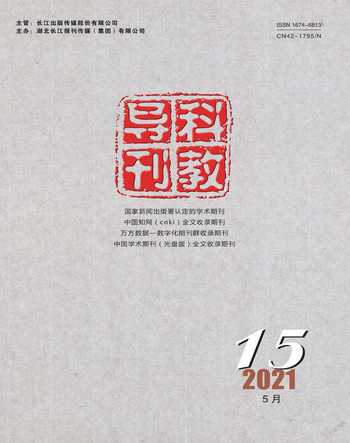努力實現一堂課的概念進階
張軍霞
我們倡導要提高課堂教學的有效性,實現學生課堂教學的真正獲得。對于科學課堂教學,我們可以從微觀層面上組織課堂教學的具體內容,厘清課堂教學的主線。對于教學目標中包含課程標準要求的某一學習目標的科學課堂來說,可以按照學生理解這一學習目標的由淺入深的發展路徑組織學習內容,實現一堂課的概念進階。課程標準中的各水平級學習目標,可以理解為由某一主要概念分解的水平級概念。在40分鐘的課堂上理解一個水平級概念,可以參考《基于核心素養學習進階的科學教學設計》一文中用于較短時間內具體科學概念的學習進階的“科學概念理解的發展層級模型”(以下簡稱層級模型)進行設計。
層級模型將對概念理解的發展路徑分為經驗、映射、關聯、系統和整合五個層級。這五個層級的概念理解程度可以這樣理解:經驗,學生具有一些沒有產生相互關聯的日常經驗和零散事實;映射,學生能夠建立概念與經驗之間的關系;關聯,學生能夠建立概念與多個經驗特征之間的關系;系統,學生能夠建構對科學概念的基本理解;整合,學生能夠在更廣泛的情境中應用概念,表現出具有一定的科學觀念,或跨學科解決問題的能力。
例如,二年級《把它們放進水里》一課,設定的重點教學目標對應課程標準中的1~2年級學習目標:知道有些物體能夠溶解在一定量的水中,如食鹽和白糖等;有些物質很難溶解在水里,如沙和食用油等。按照層級模型的發展路徑開展教學,能夠使學生在一堂課中初步建構這一概念。
經驗:出示白砂糖、酸梅晶(或紅糖)、木屑、沙子等一些易溶解和難溶解的固體物質,讓學生預測這些物質放入水中會怎樣,獲得學生對溶解的原有認識。
映射:將這些固體物質放入水中,獲得對溶解的最初認識——固體看不見了。
關聯:將酸梅晶放入水中,觀察酸梅晶放入水中的過程,獲得對溶解的初步認識——固體均勻分散在水中。將食用油、蜂蜜等液體物質放入水中,獲得對溶解的初步認識:液體也能均勻分散在水中。
系統:通過對上述現象的歸納,初步概括什么是溶解——物質均勻分散在水中,看不見了。
整合:在本節課即將結束之時,將許多鹽倒入少量水中,獲得指向主要概念的科學認識——物質在水中溶解的量受到水量的限制,即物質溶解在一定量的水里。
如果教學目標包含的科學概念有多重含義,在應用層級模型進行教學設計時,五個層級可以交錯進行。
例如,三年級《食物的消化》一課,設定的重點教學目標對應課程標準中的3~4年級學習目標:簡要描述人體用于攝取養分的器官。本課教學對消化器官的認識,要與食物進入人體被消化的路徑結合起來。
經驗1:在口腔里咀嚼饅頭,體會咀嚼過的饅頭在牙齒、舌頭、唾液作用下,變小了、黏了、甜了。
映射1:用碘酒檢查咀嚼過和沒有咀嚼過的饅頭,體會饅頭的初步消化——部分淀粉變為糖。
關聯:吃入冰鎮的水果,體會食物由口腔進入消化器官的上部路徑——食物從口腔經食道進入胃。
經驗2:畫食物路徑圖,了解學生對消化器官的已有認知。
映射2:觀察消化器官立體圖,初步認識消化器官。
系統:觀看介紹消化器官的視頻資料,綜合以上教學經驗,學生可以認識食物在經過消化器官的過程中逐漸被消化、吸收的基本過程。
整合:如果還有教學時間,本課最后可以引導學生學習如何保護消化器官。
以上探討的都是以建構科學概念為重點教學目標的課例。不以建構科學概念為主的其他科學課堂,如屬于技術與工程領域的設計、制作、評估、改進等課,需要結合設計思維與工程思維設計教學。
Strive to Realize the Concept Advancement of a Class
ZHANG Junxia
中圖分類號:G424文獻標識碼:ADOI:10.16400/j.cnki.kjdk.2021.05.001
ZHANG Junxia
Deputy Director (in charge of work) and Editor of Comprehensive Science Department of People’s Education Press
Member of the Textbook Compilation Group of Science Published by People’s Education Hubei Education Press
Deputy Secretary General of Science Popularization Education Committee of China Science Popularization Writers Association
We advocate improving the effectiveness of class? room teaching and realizing the real acquisition of students’ classroomteaching. For scienceclassroom teaching,wecanorganizethespecificcontentof classroom teaching from the micro level and clarify the main line of classroom teaching. For the science classroom whose teaching objectives include a certain learning objective required by the curriculumstan? dard, we can organize the learning content according to the development path of students’ understanding of this learning objective, and realize the concept ad? vancement of a class. The learning objectives of each level in the curriculum standard can be understood as the level concept decomposed by a main concept. Tounderstandalevelconceptinthe40-minute class, we can refer to the "hierarchical model for the developmentofscientificconceptunderstanding"(hereinafter referred to as the hierarchical model) in the article "advanced science teaching design based oncoreliteracylearning",whichisusedforthe learning of specific scientific concepts in a short time.
The hierarchical model divides the development path of concept understanding into five levels: experi? ence,mapping,relevance,systemandintegration. These five levels of conceptual understanding can be understood as follows: experience, students have some daily experience and scattered facts that are not relat? ed to each other; Mapping, students can establish the relationshipbetweenconceptandexperience;Rele? vance, students can establish the relationship between concepts and multiple experience characteristics; Sys? tem, students can construct the basic understanding ofscientificconcepts;Throughintegration,students can apply concepts in a wider range of situations and show a certain scientific concept or interdisciplin? ary problem-solving ability.
For example, in the second grade lesson "put them in the water", the key teaching objectives set correspond to the learning objectives of grade 1-2 in the curriculum standard: know that some objects can be dissolved in a certain amount of water, such as salt and sugar, etc; Some substances are difficult to dissolve in water, such as sand and edible oil. Ac? cording to the development path of hierarchical mod? el, students can construct this concept in a class.
Experience: show some soluble and insoluble sol? id substances, such as white granulated sugar, sour plum crystal (or brown sugar), sawdust, sand, etc., andaskstudentstopredicthowthesesubstances will be put into water, so as to obtain students’ origi? nal understanding of dissolution.
Mapping: put these solids in water to get the first idea of dissolution - the solids are out of sight.
Relevance: put sour plum crystal into water, ob? serve the process of putting sour plum crystal into water, and get a preliminary understanding of dissolu? tion - solid is evenly dispersed in water. Put edible oil, honey and other liquid substances into water to get a preliminary understanding of dissolution: liquid can also be evenly dispersed in water.
System: through the induction of the above phe? nomena, we can preliminarily summarize what is dis? solution - the matter is evenly dispersed in water and cannot be seen.
Integration: at the end of this lesson, pour a lot of salt into a small amount of water to get a scientif? icunderstandingofthemainconceptthatthe amount of matter dissolved in water is limited by the amount of water, that is, matter dissolved in a cer? tain amount of water.
If the scientific concepts contained in the teach? ing objectives have multiple meanings, the five levels can be staggered when applying the hierarchical mod? el to the teaching design.
For example, in the third grade of "food diges? tion", the key teaching goal set corresponds to the learning goal of grade 3-4 in the curriculum stan? dard: briefly describe the organs used by the human body to absorb nutrients. The understanding of diges? tive organs in this course should be combined with the path of food entering the human body and being digested.
Experience1:chewingsteamedbreadinthe mouth,experiencechewingsteamedbreadinthe teeth, tongue, saliva, smaller, sticky, sweet.
Mapping1:checksteamedbreadchewedand not chewed with iodine wine, and experience the ini? tial digestionof steamedbread--part of starch turns into sugar.
Relevance: eating iced fruit, experience the up? per path of food from the mouth to the digestive or? gans - food from the mouth through the esophagus into the stomach.
Experience 2: draw food path map to understand students’ cognition of digestive organs.
Mapping 2: observe the stereogram of digestive organs to get a preliminary understanding of digestive organs.
System: by watching the video materials about di? gestive organs and integrating the above teaching ex? perience, students can understand the basic process that food is gradually digested and absorbed in the process of passing through digestive organs.
Integration: if there is still teaching time, this lesson can guide students to learn how to protect di? gestive organs.
The above discussion is based on the construc? tion of scientific concepts as the focus of teaching ob? jectives. Other science classes that do not focus on the construction of scientific concepts, such as de? sign, production, evaluation and improvement in the field of technology and engineering, need to combine design thinking with engineering thinking.

